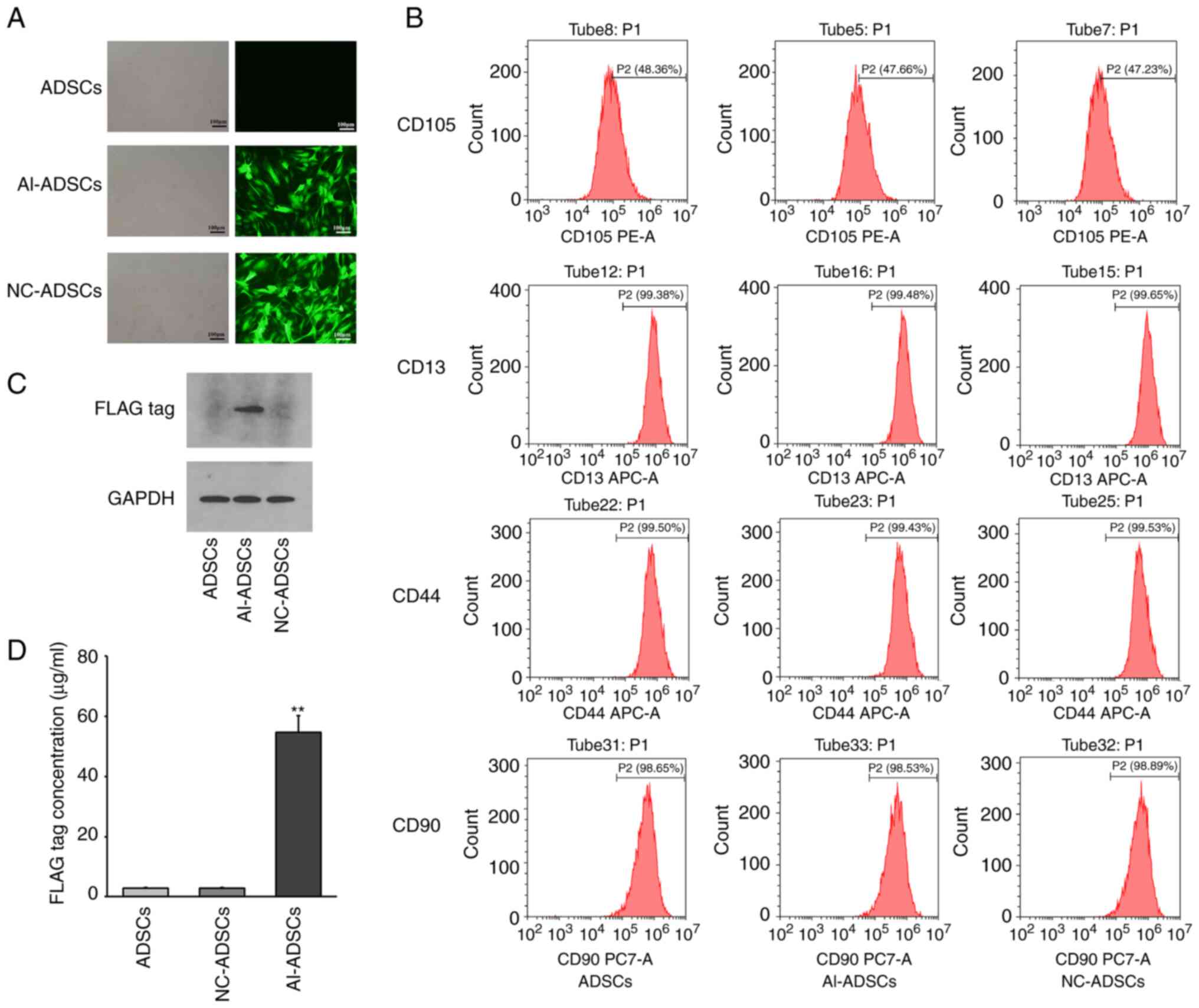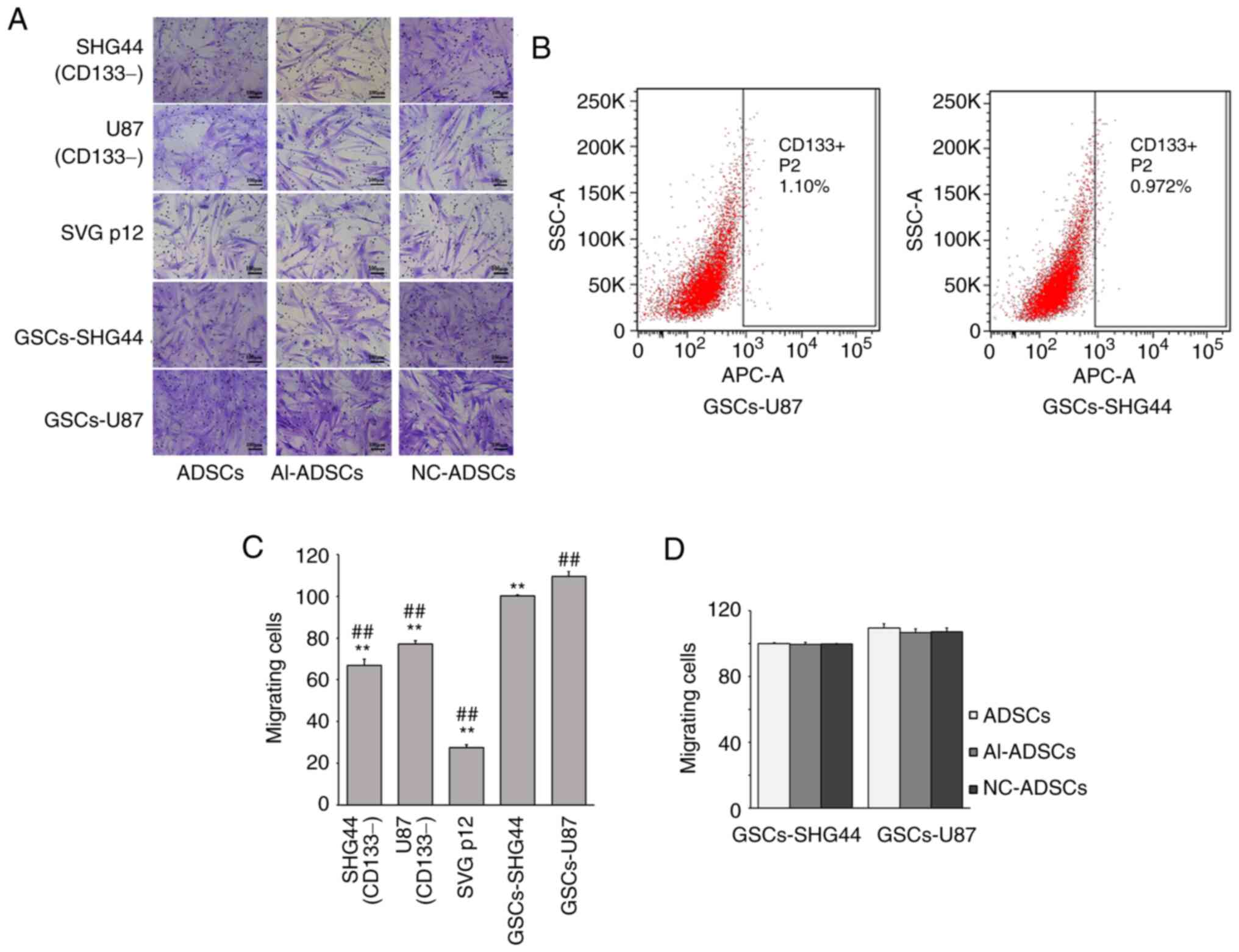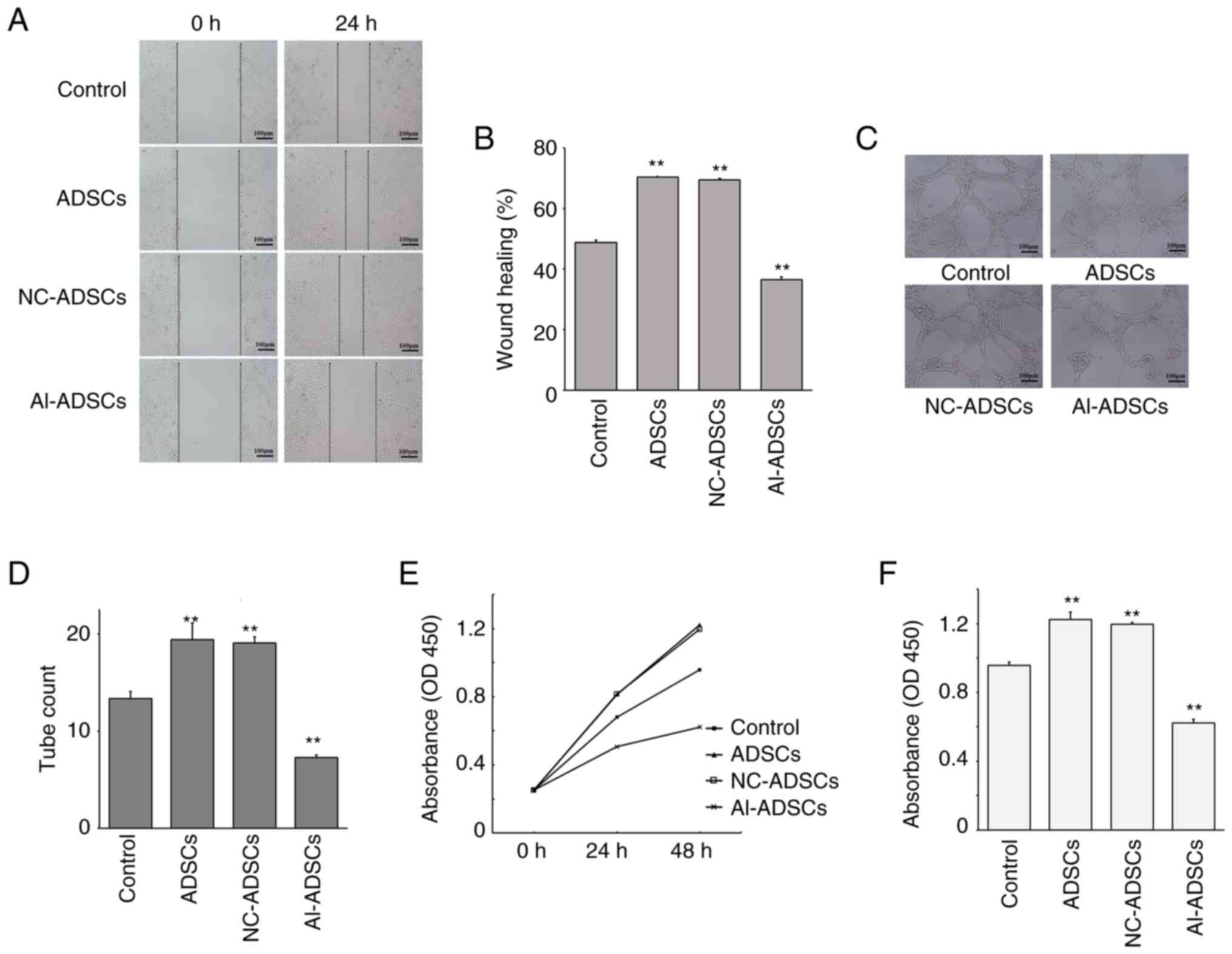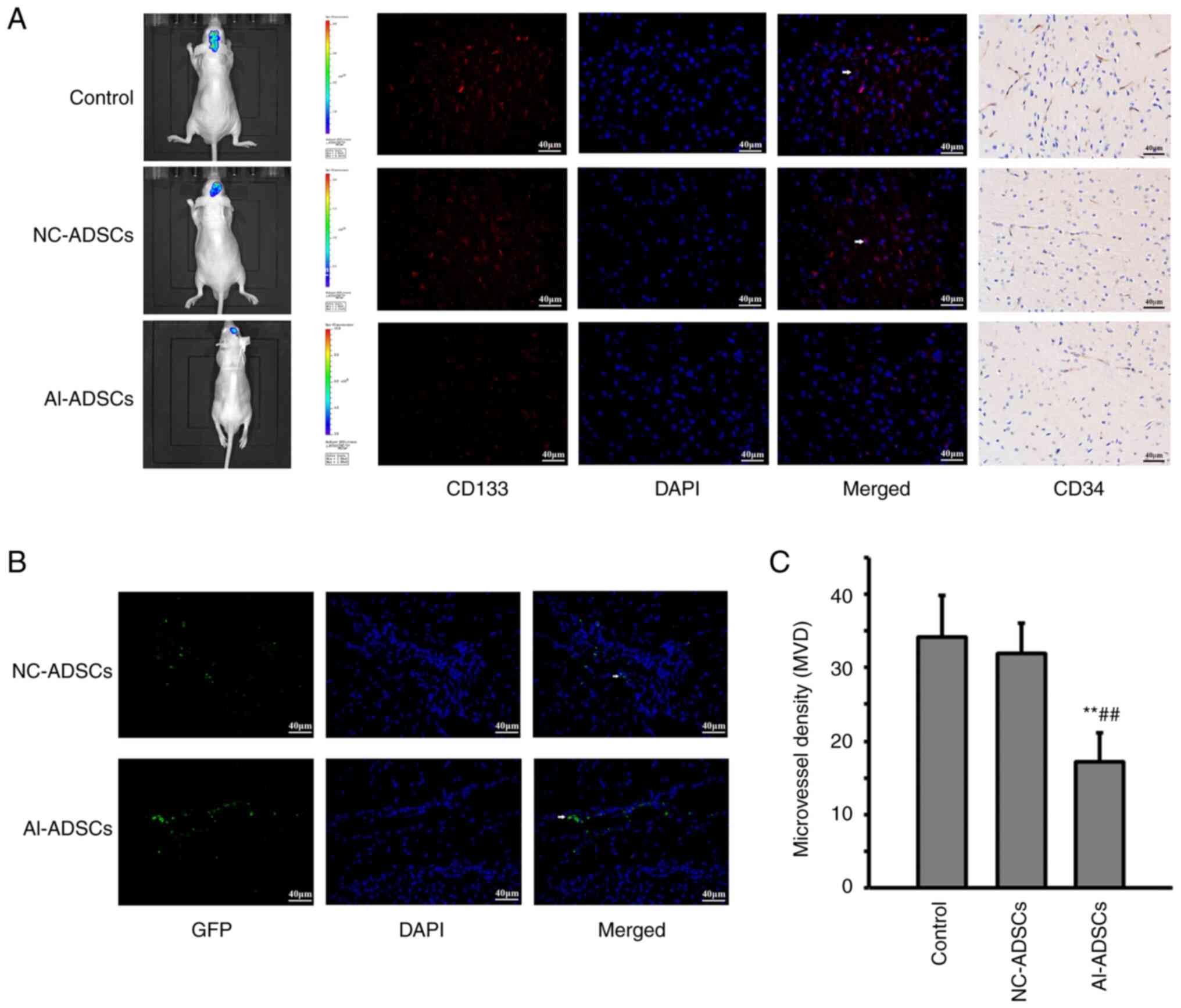|
1
|
Stupp R, Lukas RV and Hegi ME: Improving
survival in molecularly selected glioblastoma. Lancet. 393:615–617.
2019. View Article : Google Scholar : PubMed/NCBI
|
|
2
|
Ahir BK, Engelhard HH and Lakka SS: Tumor
development and angiogenesis in adult brain tumor: Glioblastoma.
Mol Neurobiol. 57:2461–2478. 2020. View Article : Google Scholar : PubMed/NCBI
|
|
3
|
García-Romero N, Palacín-Aliana I, Madurga
R, Carrión-Navarro J, Esteban-Rubio S, Jiménez B, Collazo A,
Pérez-Rodríguez F, Ortiz de Mendivil A, Fernández-Carballal C, et
al: Bevacizumab dose adjustment to improve clinical outcomes of
glioblastoma. BMC Med. 18:1422020. View Article : Google Scholar : PubMed/NCBI
|
|
4
|
Schulte JD, Aghi MK and Taylor JW:
Anti-angiogenic therapies in the management of glioblastoma. Chin
Clin Oncol. 10:372021. View Article : Google Scholar : PubMed/NCBI
|
|
5
|
Staton CA, Brown NJ, Rodgers GR, Corke KP,
Tazzyman S, Underwood JC and Lewis CE: Alphastatin, a 24-amino acid
fragment of human fibrinogen, is a potent new inhibitor of
activated endothelial cells in vitro and in vivo. Blood.
103:601–606. 2004. View Article : Google Scholar : PubMed/NCBI
|
|
6
|
Guo SW, Che HM and Li WZ: Anti-tumor
effect of lentivirus-mediated gene transfer of alphastatin on human
glioma. Cancer Sci. 102:1038–1044. 2011. View Article : Google Scholar : PubMed/NCBI
|
|
7
|
Quiñones JP, Peniche H and Peniche C:
Chitosan based self-assembled nanoparticles in drug delivery.
Polymers (Basel). 10:2352018. View Article : Google Scholar : PubMed/NCBI
|
|
8
|
Yu H, Yang Z, Li F, Xu L and Sun Y:
Cell-mediated targeting drugs delivery systems. Drug Deliv.
27:1425–1437. 2020. View Article : Google Scholar : PubMed/NCBI
|
|
9
|
Porada CD and Almeida-Porada G:
Mesenchymal stem cells as therapeutics and vehicles for gene and
drug delivery. Adv Drug Deliv Rev. 62:1156–1166. 2010. View Article : Google Scholar : PubMed/NCBI
|
|
10
|
Zhang J, Liu Y, Chen Y, Yuan L, Liu H,
Wang J, Liu Q and Zhang Y: Adipose-derived stem cells: Current
applications and future directions in the regeneration of multiple
tissues. Stem Cells Int. 2020:88108132020. View Article : Google Scholar : PubMed/NCBI
|
|
11
|
Kucerova L, Altanerova V, Matuskova M,
Tyciakova S and Altaner C: Adipose tissue-derived human mesenchymal
stem cells mediated prodrug cancer gene therapy. Cancer Res.
67:6304–6313. 2007. View Article : Google Scholar : PubMed/NCBI
|
|
12
|
Choi SA, Lee JY, Kwon SE, Wang KC, Phi JH,
Choi JW, Jin X, Lim JY, Kim H and Kim SK: Human adipose
tissue-derived mesenchymal stem cells target brain tumor-initiating
cells. PLoS One. 10:e01292922015. View Article : Google Scholar : PubMed/NCBI
|
|
13
|
Liang C, Shangguan J, Yang L and Guo S:
Downregulation of astrocyte elevated gene-1 expression inhibits the
development of vasculogenic mimicry in gliomas. Exp Ther Med.
21:222021.PubMed/NCBI
|
|
14
|
Liang C, Guo S and Yang L: Effects of
all-trans retinoic acid on VEGF and HIF-1α expression in glioma
cells under normoxia and hypoxia and its anti-angiogenic effect in
an intracerebral glioma model. Mol Med Rep. 10:2713–2719. 2014.
View Article : Google Scholar : PubMed/NCBI
|
|
15
|
Workman P, Aboagye EO, Balkwill F, Balmain
A, Bruder G, Chaplin DJ, Double JA, Everitt J, Farningham DA,
Glennie MJ, et al: Guidelines for the welfare and use of animals in
cancer research. Br J Cancer. 102:1555–1577. 2010. View Article : Google Scholar : PubMed/NCBI
|
|
16
|
Chen L, Li T, Li R, Wei B and Peng Z:
Alphastatin downregulates vascular endothelial cells sphingosine
kinase activity and suppresses tumor growth in nude mice bearing
human gastric cancer xenografts. World J Gastroenterol.
12:4130–4136. 2006. View Article : Google Scholar : PubMed/NCBI
|
|
17
|
Staton CA, Stribbling SM,
Garcia-Echeverria C, Bury JP, Tazzyman S, Lewis CE and Brown NJ:
Identification of key residues involved in mediating the in vivo
anti-tumor/anti-endothelial activity of alphastatin. J Thromb
Haemost. 5:846–854. 2007. View Article : Google Scholar : PubMed/NCBI
|
|
18
|
Che H, Song J, Guo S, Wang W and Gao G:
Inhibition of xenograft human glioma tumor growth by
lentivirus-mediated gene transfer of alphastatin. Oncol Rep.
29:1101–1107. 2013. View Article : Google Scholar : PubMed/NCBI
|
|
19
|
Guo SW, Che HM and Li WZ: Construction of
recombinant lentivirus vector for tumor vasoinhibitory peptide
alphastatin gene delivery. Mol Med Rep. 3:923–928. 2010.PubMed/NCBI
|
|
20
|
Meadows KN, Bryant P, Vincent PA and
Pumiglia KM: Activated Ras induces a proangiogenic phenotype in
primary endothelial cells. Oncogene. 23:192–200. 2004. View Article : Google Scholar : PubMed/NCBI
|
|
21
|
Carmeliet P and Collen D: Molecular basis
of angiogenesis. Role of VEGF and VE-cadherin. Ann N Y Acad Sci.
902:249–264. 2000. View Article : Google Scholar : PubMed/NCBI
|
|
22
|
Chrifi I, Louzao-Martinez L, Brandt M, van
Dijk CGM, Burgisser P, Zhu C, Kros JM, Duncker DJ and Cheng C:
CMTM3 (CKLF-Like marvel transmembrane domain 3) mediates
angiogenesis by regulating cell surface availability of VE-cadherin
in endothelial adherens junctions. Arterioscler Thromb Vasc Biol.
37:1098–1114. 2017. View Article : Google Scholar : PubMed/NCBI
|
|
23
|
Duan HF, Wu CT, Lu Y, Wang H, Liu HJ,
Zhang QW, Jia XX, Lu ZZ and Wang LS: Sphingosine kinase activation
regulates hepatocyte growth factor induced migration of endothelial
cells. Exp Cell Res. 298:593–601. 2004. View Article : Google Scholar : PubMed/NCBI
|
|
24
|
Shu X, Wu W, Mosteller RD and Broek D:
Sphingosine kinase mediates vascular endothelial growth
factor-induced activation of ras and mitogen-activated protein
kinases. Mol Cell Biol. 22:7758–7768. 2002. View Article : Google Scholar : PubMed/NCBI
|
|
25
|
Wang XX, Sun RJ, Wu M, Li T, Zhang Y and
Chen L: Differential protein expression in EC304 gastric cancer
cells induced by alphastatin. Asian Pac J Cancer Prev.
13:1667–1674. 2012. View Article : Google Scholar : PubMed/NCBI
|
|
26
|
Feng Y, Gross S, Wolf NM, Butenschön VM,
Qiu Y, Devraj K, Liebner S, Kroll J, Skolnik EY, Hammes HP and
Wieland T: Nucleoside diphosphate kinase B regulates angiogenesis
through modulation of vascular endothelial growth factor receptor
type 2 and endothelial adherens junction proteins. Arterioscler
Thromb Vasc Biol. 34:2292–2300. 2014. View Article : Google Scholar : PubMed/NCBI
|
|
27
|
Li Z, Huo X, Chen K, Yang F, Tan W, Zhang
Q, Yu H, Li C, Zhou D, Chen H, et al: Profilin 2 and endothelial
exosomal profilin 2 promote angiogenesis and myocardial infarction
repair in mice. Front Cardiovasc Med. 9:7817532022. View Article : Google Scholar : PubMed/NCBI
|
|
28
|
Huang B, Huang LF, Zhao L, Zeng Z, Wang X,
Cao D, Yang L, Ye Z, Chen X, Liu B, et al: Microvesicles (MIVs)
secreted from adipose-derived stem cells (ADSCs) contain multiple
microRNAs and promote the migration and invasion of endothelial
cells. Genes Dis. 7:225–234. 2019. View Article : Google Scholar : PubMed/NCBI
|
|
29
|
Gangadaran P, Rajendran RL, Oh JM, Oh EJ,
Hong CM, Chung HY, Lee J and Ahn BC: Identification of angiogenic
cargo in extracellular vesicles secreted from human adipose
tissue-derived stem cells and induction of angiogenesis in vitro
and in vivo. Pharmaceutics. 13:4952021. View Article : Google Scholar : PubMed/NCBI
|
|
30
|
Pendleton C, Li Q, Chesler DA, Yuan K,
Guerrero-Cazares H and Quinones-Hinojosa A: Mesenchymal stem cells
derived from adipose tissue vs bone marrow: In vitro comparison of
their tropism towards gliomas. PLoS One. 8:e581982013. View Article : Google Scholar : PubMed/NCBI
|
|
31
|
Chuang CC, Chen YN, Wang YY, Huang YC, Lin
SY, Huang RY, Jang YY, Yang CC, Huang YF and Chang CW: Stem
cell-based delivery of gold/chlorin e6 nanocomplexes for combined
photothermal and photodynamic therapy. ACS Appl Mater Interfaces.
12:30021–30030. 2020. View Article : Google Scholar : PubMed/NCBI
|
|
32
|
Huang WC, Lu IL, Chiang WH, Lin YW, Tsai
YC, Chen HH, Chang CW, Chiang CS and Chiu HC: Tumortropic
adipose-derived stem cells carrying smart nanotherapeutics for
targeted delivery and dual-modality therapy of orthotopic
glioblastoma. J Control Release. 254:119–130. 2017. View Article : Google Scholar : PubMed/NCBI
|
|
33
|
Feng Y, Zhu M, Dangelmajer S, Lee YM,
Wijesekera O, Castellanos CX, Denduluri A, Chaichana KL, Li Q,
Zhang H, et al: Hypoxia-cultured human adipose-derived mesenchymal
stem cells are non-oncogenic and have enhanced viability, motility,
and tropism to brain cancer. Cell Death Dis. 5:e15672014.
View Article : Google Scholar : PubMed/NCBI
|
|
34
|
Heddleston JM, Hitomi M, Venere M,
Flavahan WA, Yang K, Kim Y, Minhas S, Rich JN and Hjelmeland AB:
Glioma stem cell maintenance: The role of the microenvironment.
Curr Pharm Des. 17:2386–2401. 2011. View Article : Google Scholar : PubMed/NCBI
|
|
35
|
Schiffer D, Annovazzi L, Casalone C,
Corona C and Mellai M: Glioblastoma: Microenvironment and niche
concept. Cancers (Basel). 11:52018. View Article : Google Scholar : PubMed/NCBI
|
|
36
|
Calabrese C, Poppleton H, Kocak M, Hogg
TL, Fuller C, Hamner B, Oh EY, Gaber MW, Finklestein D, Allen M, et
al: A perivascular niche for brain tumor stem cells. Cancer Cell.
11:69–82. 2007. View Article : Google Scholar : PubMed/NCBI
|
|
37
|
Peng L, Ming Y, Zhang L, Zhou J, Xiang W,
Zeng S, He H and Chen L: MicroRNA-30a suppresses self-renewal and
tumorigenicity of glioma stem cells by blocking the NT5E-dependent
Akt signaling pathway. FASEB J. 34:5128–5143. 2020. View Article : Google Scholar : PubMed/NCBI
|


















